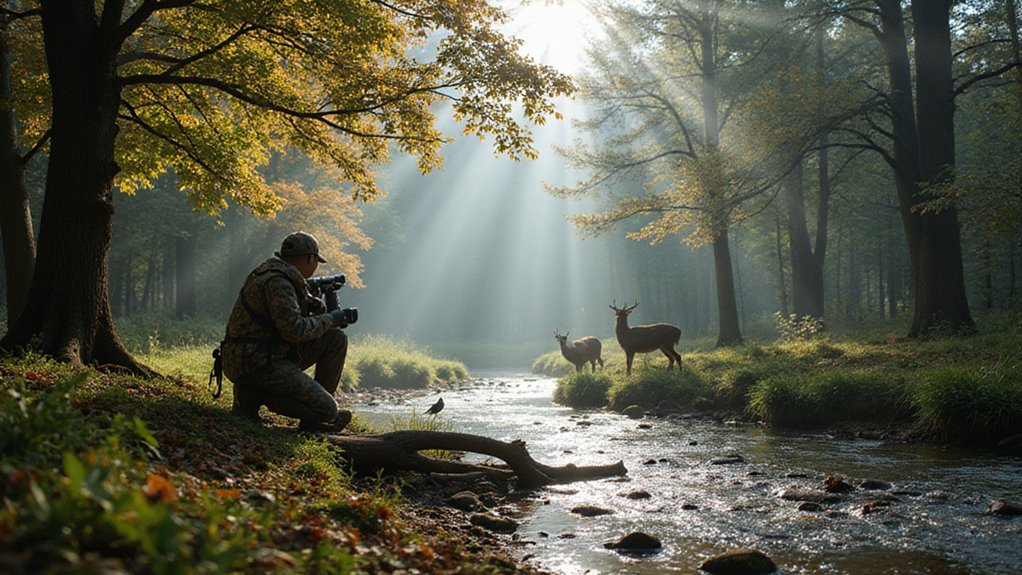When you think about hunting, it’s easy to focus on the thrill of the chase. However, there’s much more beneath the surface. Hunting can teach you valuable life skills, connect you with nature, and even contribute to wildlife conservation. But what about the impact on your health and community? Understanding the broader implications might just shift your perspective. Let’s explore the many benefits that hunting brings to individuals and society as a whole.
What Are the Benefits of Hunting?
Hunting offers a range of benefits that can enhance your life and the environment around you. You’ll develop valuable skills like patience, focus, and perseverance while honing your marksmanship.
It’s a great way to connect with nature, allowing you to appreciate wildlife and the outdoors more deeply. Plus, hunting encourages physical fitness through hiking and tracking game.
By participating in hunting, you also foster community bonds, often sharing experiences with family and friends. Additionally, you can enjoy fresh, organic meat, promoting healthier eating habits.
Ultimately, hunting can enrich your life while contributing positively to the environment around you.
Why is Hunting Important for Wildlife Conservation?
While many people view hunting as merely a sport, it plays an essential role in wildlife conservation efforts. When you participate in hunting, you contribute to population control of certain species, preventing overpopulation that can lead to habitat destruction.
Additionally, hunting licenses and fees often fund conservation programs, helping maintain ecosystems and protect endangered species. By supporting regulated hunting practices, you help guarantee a balance between wildlife and their habitats.
Furthermore, hunting fosters an appreciation for nature and encourages responsible stewardship of the environment. Ultimately, your involvement in hunting can directly impact wildlife conservation in a positive way.
How Does Hunting Promote Sustainable Practices?
Engaging in regulated hunting practices encourages sustainable approaches to wildlife management and land use.
By participating in hunting, you contribute to population control of certain species, preventing overpopulation and habitat degradation. The funds generated from hunting licenses and fees often support conservation initiatives, helping maintain ecosystems.
Additionally, responsible hunters advocate for ethical practices, promoting a balance between wildlife and human needs. You also foster awareness of local wildlife, encouraging community involvement in conservation efforts.
What Physical Health Benefits Are Associated with Hunting?
Participating in hunting can greatly enhance your physical health, as it combines outdoor activity with the thrill of the chase.
You’ll engage in various physical activities like walking, climbing, and even crawling, which can improve your cardiovascular fitness. Carrying gear and game helps build strength and endurance.
The time spent outdoors exposes you to fresh air and sunlight, boosting your vitamin D levels. Additionally, hunting often requires focus and coordination, enhancing your fine motor skills.
How Can Hunting Enhance Mental Well-Being?
Hunting can greatly boost your mental well-being by fostering a sense of connection to nature and a break from daily stressors.
Spending time outdoors, you can immerse yourself in the sights, sounds, and smells of the wilderness, which often leads to reduced anxiety and improved mood. The focus required during hunting sharpens your concentration and promotes mindfulness, helping you to be present in the moment.
Furthermore, the thrill of the hunt can elevate your adrenaline, enhancing feelings of excitement and accomplishment.
What Role Does Hunting Play in Building Community and Tradition?
While many activities can bring people together, few foster a sense of community and tradition quite like hunting. When you head into the woods with friends or family, you’re not just pursuing game; you’re creating lasting memories and bonds.
Each hunt becomes a shared experience, passed down through generations, reinforcing your connections. Traditions like preparing meals from the hunt or sharing stories around the campfire strengthen these ties. You celebrate successes and learn from failures together, deepening your sense of belonging.
Ultimately, hunting cultivates a unique culture that enriches relationships and honors the legacy of those who came before you.
How Does Hunting Contribute to the Economy?
Engaging in hunting not only strengthens community bonds but also serves as a significant economic driver.
When you participate in hunting, you’re contributing to various sectors that boost local economies. Here are some ways hunting impacts the economy:
- Gear and Equipment Sales: You buy rifles, clothing, and accessories, supporting local shops.
- Travel and Tourism: Hunters often travel, benefiting hotels, restaurants, and local attractions.
- Job Creation: Hunting-related businesses create jobs, from guides to retail staff.
- Conservation Funding: Your hunting fees often go toward wildlife conservation, ensuring a healthy ecosystem for future generations.
Why Should We Educate Future Generations About Hunting?
Educating future generations about hunting is essential for fostering a deep appreciation of nature and wildlife management. By teaching kids about hunting, you instill respect for wildlife and highlight conservation efforts.
Understanding hunting’s role in ecosystem balance helps them grasp the importance of sustainable practices. Furthermore, hunting promotes outdoor skills, self-reliance, and responsibility, shaping well-rounded individuals.
As they learn about tracking, safety, and ethical practices, they develop a connection to the land. This knowledge guarantees that future hunters advocate for wildlife preservation and responsible stewardship, preserving both heritage and habitat for generations to come.
